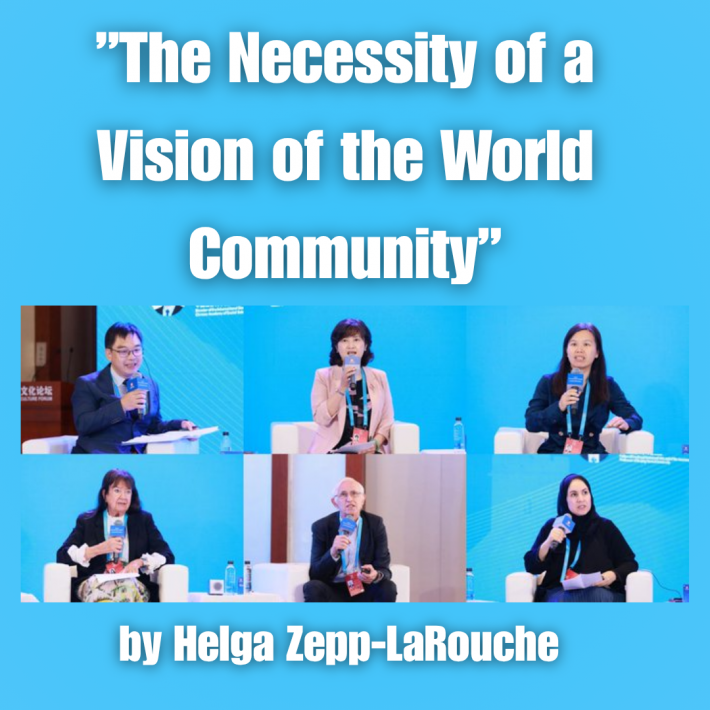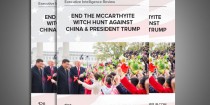Speech of Helga Zepp-LaRouche at the Sept. 23-24, 2025 Beijing Cultural Forum
World history, in the sense of Friedrich Schiller’s theory of drama, has reached a “punctum saliens” at which all previous tendencies converge as it were on a point of decision: Does humanity—which for the first time has the potential to destroy itself and all life on Earth, thanks to thermonuclear weapons, and which for the first time can follow live every single day on internet the most barbaric acts in Gaza ongoing for the last 22 months—have the moral capacity to survive? What is obvious at any rate is that the old world order—as it emerged after World War Two and especially after the end of the Cold War—and with it international law have broken down.
Even the UN, whose Charter remains the most important document of the international community, is in urgent need of reform because, as now constituted, it has proven incapable of responding adequately to the threat of war and demontage of the international order.
President Xi Jinping has now presented, with his idea of a community of shared future for mankind and the four global initiatives (GDI, GSI, GCI, and now GGI) [Global Development Initiative, Global Security Initiative, Global Civilization Initiative, Global Governance Initiative] a concept that clearly defines the next phase of human evolution. This concept has taken shape with the emergence of a new world order through the BRICS, the Belt and Road Initiative, and above all at the SCO [Shanghai Cooperation Organization] conference in Tianjin, opening up the tremendously optimistic prospect for the global majority of humanity, that the 500-year era of colonialism can finally be overcome. The Chinese-Russian partnership is the rock on which the new world order is built, and the overcoming of tensions between China and India, two cradles of humanity that together represent 35% of the world’s population, is as a guide for positive change among all nations whose relationships are fraught with manipulations going back to the colonial era.
The tectonic shift underway with the emergence of a new world order, based on the tradition of the Five Principles of Peaceful Coexistence and the Non-Aligned Movement, and pursued under Xi Jinping’s four initiatives, clearly creates the conditions for lasting peace in the world. The appeal of this model, which offers economic progress and opportunities for cultural development to all nations, is seen in the growing number of nations in the Global South that see themselves as active and equal participants. If this dynamic existed alone, humanity would face a bright future.
However, everything now depends on finding a way to win over the nations of the former “collective West,” which has not been collective since the beginning of President Trump’s second term, to cooperate with the new emerging world order. The fact that a “Coalition of the Willing,” that insists the conflict over Ukraine must be decided on the battlefield, is needed, shows that it represents only a minority, even in Europe, and even within this coalition, the approval ratings of the respective governments are extremely low.
The distorted or non-existent reporting in Western mainstream media about the emerging world order, as seen at the recent SCO summit, means that the American and European populations do not have a clue about it. Instead, with appeals such as “Germany must become war-capable” (Pistorius), “Germany must build the strongest conventional army in Europe” (Merz), and Russia and China could become so powerful by 2027 that they would seek confrontation with NATO and the U.S., the attempt is made to prepare the population for a new militarism.
Therefore, it is urgent to find ways to demonstrate to the populations of European nations the dangers of a new militarism, as well as the positive potential that lies in cooperation with the new world order. In view of the recent rapprochement between China and India, the approach taken by President Xi, in a speech in New Delhi in 2014, would be particularly well suited for that:
“Even in ancient times, China already came to the conclusion that a warlike state, however big it may be, will eventually perish. Peace is of paramount importance, harmony without uniformity … and universal peace must be achieved. The Chinese concepts of ‘universal peace’ and ‘universal love’ and the Indian concepts of ‘Vasudhaiva Kutumbakum’ (the world being one family) and ahimsa (causing no injury) are very much alike.”
President Xi’s Global Civilization Initiative offers an excellent approach to intensifying a similar dialogue with Western cultures on the basis of the most developed concepts and ideas.
Alongside Gottfried Wilhelm Leibniz, who was a great admirer of Chinese culture and philosophy, Friedrich Schiller had a visionary idea of a united humanity, interconnected through aesthetic education and self-cultivation to the highest ideal of humanity. Schiller’s recognition that this ideal could be achieved through aesthetic education had great influence in China, due to the intervention of the scholar Cai Yuanpei, the first Minister of Education of the Provisional Republic of China and later President of Peking University. Cai Yuanpei introduced Schiller’s concept of aesthetic education into the Chinese education system and created a new word for it: “meiju.” And inspired by Schiller’s idea expressed in his “Ode to Joy”—”All men become brothers”—he developed a vision of a “great community” of the whole world, “datong shijie,” which would live together peacefully and harmoniously, without armies or war. Cai saw dialogue among cultures as the way to achieve this goal, believing that a nation must embrace the cultures of other peoples: “If you look at the development of history, you can see that the confrontation of different cultures always leads to the emergence of a new one.”
Therefore we need to seek out those ideas and concepts in all cultures and civilizations, out of which their greatest minds, their greatest poets, and thinkers have developed visions of a common future for humanity. These ideas have been almost forgotten in the West today, at least among the warmongering circles who, despite their constant talk of “Western values,” no longer have any idea what truly great ideas are. Exchanges among the peoples about the most beautiful works of different cultures will not only foster understanding, but also love for them.
Chinese initiatives have already proven that the principle of “peace through development” can truly overcome deep conflicts, as can be seen in China’s mediating role between Iran and Saudi Arabia, or recently between Pakistan and Afghanistan. There is, therefore, justified hope that the combination of joint economic development and dialogue about the best traditions of the respective cultures will also succeed in bringing the European nations and even America into this global community! In any case, this is a goal to which we should devote ourselves with all the passion of our love for humanity!











